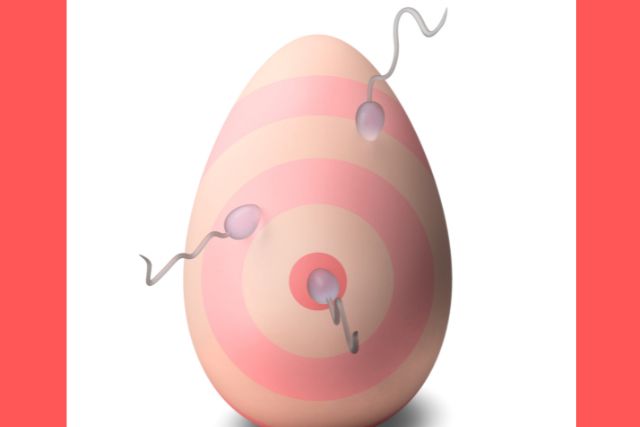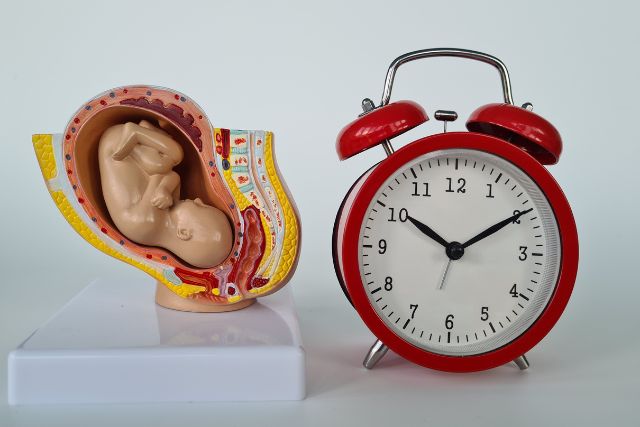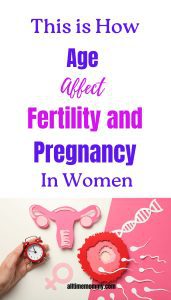Age and Fertility: How Does Age Affect Fertility and Pregnancy In Women?
As 21st-century women, we have the privilege of choice over our lives. But, when it comes to age and fertility, we may be limited.
This is because a woman’s fertility declines with age. Choosing to have a baby later in life can be great but may also increase pregnancy complications.
In this article, I’m going to answer the following questions;
- What is a reproductive life plan?
- How does age affect fertility in women?
- What are the benefits of getting pregnant at a younger age?
- What are the risks of getting pregnant at age 35 and above?
- When should you see a doctor for fertility-related issues?
The Reproductive Life Plan
As a woman, you should have a roadmap of your reproductive journey. Would you like to have children someday? If so, when? Answering this question gives you a glimpse of when to beginning preparing for pregnancy.
Having said so,
We can conclude that there is no specified perfect time to have a baby. Many factors determine the decision to get pregnant, and age is just one of them.
Women’s Age and Fertility: How Does Age Affect Fertility in Women?
According to research, a woman’s peak reproductive years are in her teens and 20s. By the time you reach 32 years, your fertility begins to decline. The decline becomes rapid as you age. And, by the time you’re 45 years, your chances of conceiving will be lower due to decreased fertility rate.
This happens because, as a woman, you begin life with a fixed number of eggs in your ovaries. Right from your mommy’s womb, you had all the egg cells you’re ever going to have, and surprisingly, they decrease as you age.
Studies estimate these eggs to be around 6-8 million at week 20 of your gestation period. By the time you’re born, this number would have decreased to about 2 million and the decrease continues as you age.
Let’s do some calculations.
A girl may have between 300,000 and 400,000 eggs at puberty, having lost around 10,000 eggs each month through her menstrual cycle. By age 37, this girl might only be having 25,000 eggs!
Also, not only do women’s eggs decline in quantity, but their quality significantly decreases as they age.
Related: This is all you need to know about Seed Cycling for hormonal balance and Menstrual Cramps
How Many Eggs Does a Woman Lose Monthly After Puberty?
The number of eggs that die each month decreases after puberty.
Instead of losing an average of 10,000 eggs, you may only lose an average of 1,000 (immature) eggs every month, which is about 30 to 35 per day.
How Many Eggs Does a Woman Have at 30?
In her early thirties, a woman’s fertility rate is still very high. However, as you approach the late thirties, the ovarian reserve declines sharply. For example, at 30, you may have about 100,000-150,000 eggs in reserve. By 35, that number will have decreased to 80,000. And, as you approach 38, that number could be 25,000, 10,000, or fewer.
Related; How To Boost Fertility In Your 30s
How Many Eggs Does a Woman Have at 40?
At 40, you may be having 5000 -10000 eggs in your ovarian reserve. During this time, the decrease rate increase sharply. However, this does not mean that you cannot conceive. Many women have conceived and given birth to healthy babies even after 40 years.
How Many Eggs Does a Woman Have at 50?
According to research, the average age of menopause is around 51-52 years of age. Hence, in your 50s, you may only have a few eggs left.
When eggs run out, the ovaries stop producing estrogen. A woman will thus, start menopause.
The onset of menopause also differs in different women and can be accelerated by various factors. This includes smoking, use of alcohol, or having undertaken chemotherapy. All these factors can affect the quality and quantity of your eggs.
What Causes the Loss and Decrease of Eggs in Women?
As of now, you have an overview of what happens at different ages. You also understand that a woman in the hem of their fertility loses roughly 1,000 eggs every month but only ovulates one.
So what happens to the others?
The truth is that there is no definite study that has come to a conclusive reason, however, according to fertility specialists.
In a day, 30-40 eggs are recruited from the waiting pool. They develop before maturing and being released in ovulation. The 30 to 40 eggs daily translate to about 1000 eggs in a month.
Roughly, it takes around 85-90 days for these recruited eggs to develop before the ovulation time. This means a woman would have gone through three menstrual cycles (for a 28-day cycle) before an egg matures.
Once follicles mature, they become sensitive to the FSH hormone. This hormone increases with the highest levels happening just before ovulation.
It is also responsible for stimulating the ovulation process. During this time, the ovary releases a single egg, although there could be an exception.
According to Dr. Paul C. Magarelli MD, Ph.D., “For an egg that had begun its developmental journey about 70 days, before the start of the cycle should now be responsive to FSH. This hormone will then usher it into the menstrual cycle for further development, making it a better candidate for ovulation.
But, the more recent eggs would not yet be sensitive to FSH. They will thus continue to develop.
For example, a “50 days old egg” in the current cycle will be nearly 80 days in the following cycle. Hence the probability of its survival is zero. It would have shrunk and died off.
Eggs that are around 40 days old would be approximately 70 days old next cycle. And could have a chance to be responsive to FSH, pulling it into the next menstrual cycle.
This means few eggs have a shot at reaching ovulation. Many eggs tend to reach maturity before or after ovulation; hence they shrink off or die (approx.998 eggs).
This decreasing quantity of egg-containing follicles in the ovaries is called “loss of ovarian reserve.”
The more the decrease in ovarian reserve, the more infertile a woman becomes. Eventually, they may stop having regular periods. Or stop entirely in menopause.
Diminished ovarian reserve is age-related. It usually occurs due to the natural loss of eggs and decreased eggs’ average quality.
Some factors, however, such as smoking and chronic illness, may also lead to premature menopause.
Why Does Egg Quality Decrease as We Age?
The egg quality decreases with age due to many factors, with the obvious one being differentiation abnormalities.
Before ovulation each month, your eggs begin to divide. During the division process, it is alleged that older eggs are more prone to errors, which can lead to abnormal chromosomes.
This is why the chances of having a baby with Down syndrome and other developmental abnormalities increase as you age.
What are the advantages of getting pregnant in your 20s or early thirties?
Women are most fertile in their twenties and early thirties. During this time, you have the highest number of quality eggs, which gives you many advantages. This includes;
- Easy to conceive
In your twenties, you are at the peak of your fertility. This means the chances of conceiving are high. This is also true if your partner is of a similar age.
But, suppose you have been actively trying to conceive for over a year, but you haven’t succeeded, then it is time to seek the help of a reproductive endocrinologist.
- Low risk of getting a baby with Down syndrome.
A younger woman’s eggs are less likely to have genetic abnormalities. These genetic disorders are the ones responsible for birth defects such as Down syndrome.
- Low risk of Miscarriage
The risk of miscarriage increases with age. It’s about 10 % for women in their 20s, 12 % in their early 30s, and 18 % in their mid to late 30s.
This low miscarriage risk in young girls is associated with better health and a lower risk of genetic complications.
- Low risk of getting pregnancy-related complications.
Complications such as the incompetent cervix, gestational diabetes, and high blood pressure are rare in young women. But this does not mean that they do not occur. It’s thus, essential to visit your doctor before and during pregnancy.
- Labor and birth
Most young women are physically fit and healthy. Getting pregnant in your twenties increases your chances of having faster and less complicated Labor. In most cases, you’re able to deliver naturally as opposed to using of c- section.
- Low risk of chronic illness such as diabetes
The risks of becoming diabetic increase with age. Older women are at high risk for the development of type 2 diabetes. This happens because of the combined effects of increasing insulin resistance.
This chronic illness can lower the quality of your life while negatively affecting your baby if not monitored.
- Healthy babies
Finally, younger women are less likely to have premature or low-birth-weight babies than women older than 35. In a young woman, the quality and quantity of eggs in ovaries are still high.
What are the risks of getting pregnant at age 35 and above?
For healthy women in their 20s and early 30s, around 1 in 4 women will get pregnant in any single menstrual cycle. By age 40, this number drops significantly. Only 1 in 10 women will get pregnant per menstrual cycle. This happens due to the reduced quantity and quality of eggs in the ovaries. Other risks include;
- Preeclampsia, or pregnancy-induced hypertension(PIH). This is a high blood pressure disorder that happens during pregnancy.
- Placenta previa. This is when all or part of the placenta covers the cervix or opening of the uterus. True placenta previa occurs in about one in 200 pregnancies.
- Oligohydramnios. This occurs due to low levels of amniotic fluid, and your doctor can diagnose through ultrasound.
- An incompetent cervix. This is a cervix that is too weak to stay closed during pregnancy. If you do not get medical attention, this can result in preterm birth or even the loss of the baby.
- Gestational diabetes. Gestational diabetes is an occurrence of high blood sugar during pregnancy. This happens in about 4 % of pregnant women yearly.
- Miscarriage or stillbirth
- Premature birth
- Low birth weight
- Chromosome disorders in the baby, like Down syndrome
When should you consider seeing a fertility doctor?
Fertility issues are prevalent, and to be on the safer side, you may want to see a fertility specialist if:
- You are in your early thirties or younger, and you’ve been trying to get pregnant for a year.
- You are over age 35, and you’ve been trying for more than six months.
- You are over age 40, and you’d like to start a family.
- You have a chronic illness but desires to have a baby.
Takeaway
The best time for conception is when you feel ready. Do not pressurize yourself to have a baby just because of age-related fears but rather plan for your reproductive journey.
If you choose to wait, ensure that you involve your fertility specialist. This can help you identify and deal with any health issue that may stand in your way once you’re ready.
UP NEXT:14 Ancient Secrets to Losing Weight and Staying Healthy Without Toiling



